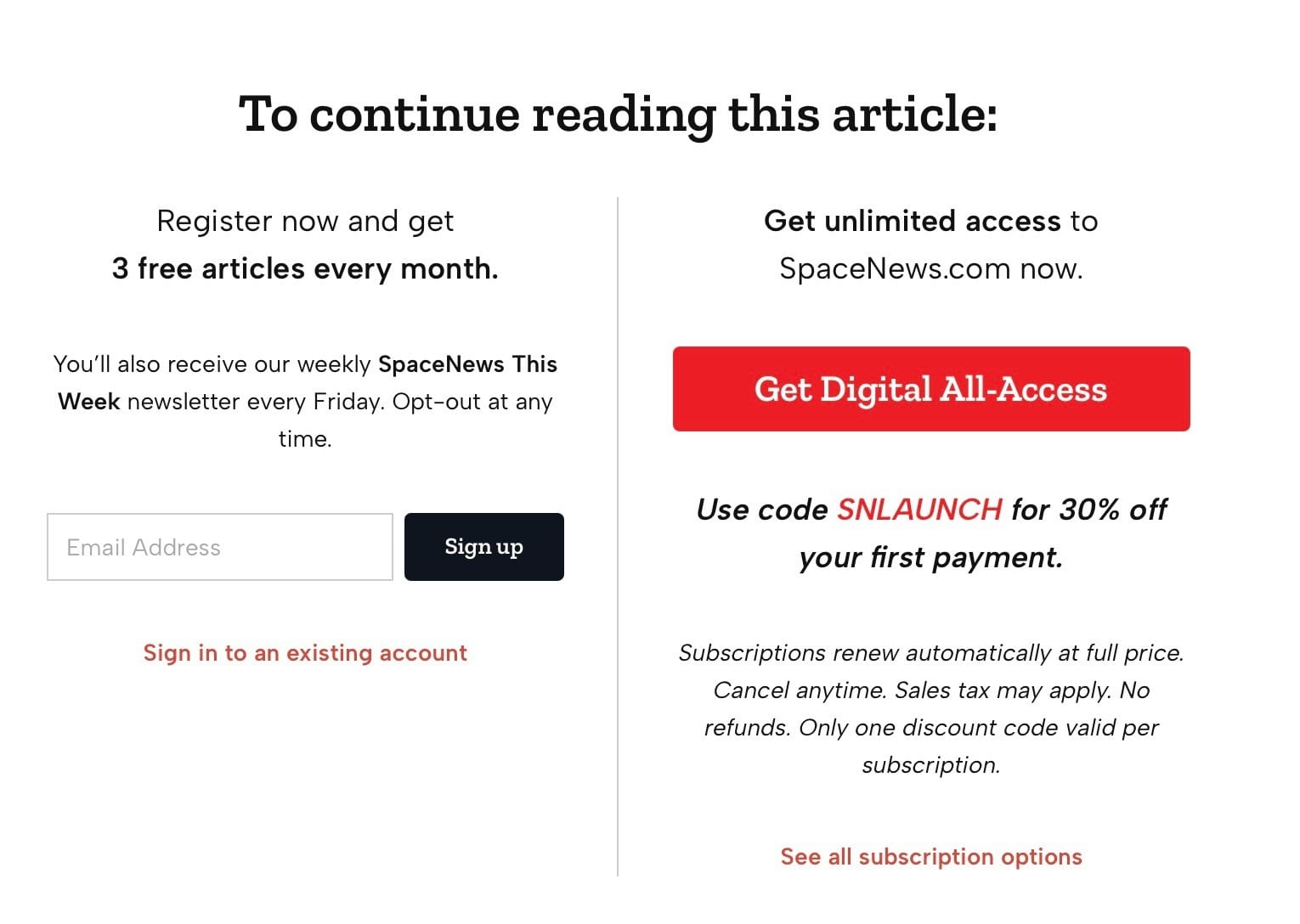On SpaceNews going paywalled, and the broader disregard for archiving in journalism
This article is a break from my usual because space communities worldwide are affected by this important topic, and I have some thoughts to offer to add to the discussions.
SpaceNews, a well known media publication in the global space industry, went paywalled for its website on July 1 with a short announcement. This led many longtime readers such as myself to run into the following view on its articles.

Considering that SpaceNews typically publishes well over a hundred stories every month, getting access to only three free monthly articles is more like a preview. For all practical purposes, the SpaceNews website is now fully paywalled.
A paywall is not necessarily bad by itself for readers across global space communities. After all, a sustained revenue source can empower good journalism. But that’s precisely why it’s disappointing to see how the wall has been erected on multiple fronts, including for my own piece on SpaceNews..
Should you paywall past pieces in retrospect?
My article on India’s Venus orbiter mission published on SpaceNews in 2020 is now behind their paywall too for some reason. I did get paid for writing the piece at the time but I also contributed it with the expectation that it will be publicly readable—just as all or most pieces on SpaceNews’ website were back then and until recently. With SpaceNews going paid now, I was not asked or even informed if I’d like to have my piece behind a paywall in such a retrospective way. I do not.
I’ve been in contact with SpaceNews about it, where I expressed the above concerns. I was told they “appreciate my perspective” but did not offer to unpaywall my article. That is frustrating.
Even recent op-eds published on SpaceNews by external experts before the paywall came into effect are made paid-only. Were the authors notified of this impending change? Shouldn’t they have been made aware of it since it could affect their right of decision to publish on SpaceNews? In many cases, op-ed contributions on media outlets are made pro bono for the mutual benefit of the author and publisher. Authors get a wider reach, and publishers get more and higher quality articles. But retrospectively paywalling pieces originally published for everyone to read for free breaks this inherent trust and deal. As such, sadly it no longer makes sense for me to recommend space experts I know to pitch op-eds to SpaceNews.
I’d argue that the principle extends even to originally free articles published by the SpaceNews staff. After all, pieces published months and years ago must’ve been already accounted for financially, be it through ads, sponsorships, donations, magazine-subsidies, or something else. Those past pieces are technically already paid for. I can completely understand paywalling new articles going forward but why gate nearly all the past pieces? [Some posts from about a year or two ago seem to be accessible; it’s not clear what’s the exact criteria for paywall exceptions.]
I’m a huge fan of Jeff Foust’s work. So much that every time anyone subscribes to my newsletter, they’re recommended his website The Space Review as part of a curated set. [Jeff is probably reading this post since I know he does read my blog. Hi Jeff!] It’s quite sad that the vast majority of Foust’s incredible work in space journalism—which is extensively cited web-wide such as on Wikipedia—is now behind a paywall. As readers of my Moon Monday blog+newsletter know, I frequently cite and link to Foust’s articles too. But now hundreds and hundreds of space-related pages on the internet at large citing such work that’s hosted on SpaceNews lead to a paywall.
Why can’t there be exceptions for communities and people to access articles that are, say, older than a year or more for archival purposes? Why can’t media publications at least make such articles accessible using a custom link similar to how Medium offers ‘friend links’.
This brings us to the next issue with the SpaceNews paywall, which is its blocking of the Internet Archive.
Blocking of public-benefit web archives
In retrospect, I should’ve seen the paywall coming because it was in February that I realized that SpaceNews articles (then free) couldn’t be accessed on the Internet Archive at web.archive.org. It’s one of the tools which—ironically—journalists use to access originally published material which may have since become modified or unavailable. It’s also useful when a website goes offline for whatever reason.
A look at SpaceNews’ robots.txt file tells you that the non-profit Common Crawl bot (CCBot) used by the Internet Archive to store webpages is explicitly blocked by the website. To be clear, it’s their right to be able to do so. But it’s also rather unsettling that it’s journalistic works, which are so valuable as archival materials, that are being fundamentally access-blocked for archival. Again, I can completely understand wanting to do so for new or recent pieces so as to prevent people from bypassing paywalls but why not allow archiving of much older articles for public benefit? How will older news articles garner more subscriptions anyway? Besides, as the website owner, SpaceNews always has the ability to take down specific pages from the Internet Archive they don’t want archived. Is that not fair game?
Several other media outlets have also blocked archival access. And, earlier this year, NASA also failed to keep many of its community webpages and documents online for months. In fact, more related documents were taken out in May. ISRO’s new website launched a few years ago still hasn’t retained many webpages and documents at their original URLs, which all point to dead pages now. The only saving grace in NASA and ISRO’s case is that web archives worked as alternative access means for the most part, illustrating their importance.
But the poignant point is that when credible journalistic outlets and even institutions as revered as NASA can’t protect public access to public works for public good, how do we trust the web’s origin as a public place? If journalism as an industry meant for public good cannot regard accessible archives as one of its foundational principles, what is even the point of our work?
On a professional yet personal note, this issue is close to me. All of my work on this blog & website is completely free to access by everyone, with no ads. My work is supported by organization and reader sponsorships. I also regularly self-archive my articles and blog posts over on the Internet Archive so that if my blog goes offline or becomes completely inaccessible in the distant future for whatever reason (such as my death), people can still browse and read fully archived copies on the Wayback Machine. Archiving also forces me to take responsibility for my mistakes and make public corrections.
Anyway, back to the matter at hand..
Pricing woes
Last but not the least let’s talk about pricing. The SpaceNews subscription’s annual base price of $230 just for digital access is steep. It’s certainly far more expensive than most popular science & technology outlets out there. Given below are equivalent subscription or membership amounts as I see them from India for various media outlets with large global readerships:
- Scientific American: $40/year
- The Hindu: $33/year
- Ars Technica: $25/year
- The Planetary Society: $50/year
- Nature: $220/year (with print access!)
- Science News: $36/year
- Sky & Telescope: $39/year
- New Scientist: $49/year
- WIRED: $30/year
- The Verge: $50/year
In other words, the absolute amount SpaceNews wishes to charge is about six times greater than what I pay for my media subscriptions of Scientific American and The Hindu respectively. And that’s without including any discounts the latter offer.
I’m disappointed that a media publication as globally read industry-wide as SpaceNews hasn’t offered variable pricing based on purchasing power parity for people in low and middle-income countries. At the very least, it could’ve been offered for digital access, where physical distribution costs are not involved. Being based in India, spending $230 just for digital access to SpaceNews feels like spending at least $600 due to purchasing power parity. The base subscription price is high enough that the one-time launch offers, or even other academic or unspecified group discounts, simply do not bring the wall down enough.
Despite all my concerns, I don’t consider the paywall in itself to be bad for readers of SpaceNews. If it empowers great journalism, I’m all for paywalls. I want nothing but for SpaceNews to thrive, and in turn further empower space communities worldwide. But as I explained in this article, there are at least three core issues in my eyes as things stand right now:
- Previously freely accessible articles by external authors should not be paywalled in retrospect without their permission.
- There should be at least some way to access old pieces, particularly for archival purposes instead of blocking a foundational journalistic element en masse.
- Make the subscription cost actually affordable.
As such, despite being a long-time reader of SpaceNews, I just can’t justify spending that much money. I can easily imagine many others feel the same way—even if we are all entrenched into the space industry globally. What if the outlet I thought was indispensable turns out to be not so? This is a good opportunity for other space media outlets to step up their game, especially ones that remain essentially free such as Spaceflight Now and NASASpaceflight—which, by the way, remains inaccessible in India for mundane reasons..
